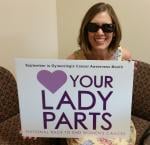Pt1b endometrial cancer Figo Grade 3 myoinvasive
What does this mean?
Comments
-
Pt1b endometrial cancer means that the tumor has invaded ≥ 50% of the myometrium. Grade 3 means that it’s a more aggressive form of uterine cancer. Doctors will typically recommend further treatment after surgery (radiation and/or chemo) for Stage 1B. Grade 3 cancers.
0 -
My friend just met with her Dr today and they have said 6 rounds of chemo (carbo/taxol) plus radiation. I have been reading threads just on the carbo/taxol…i have read on the icing, Claritin, miralax, port, b6-b12 vitamins…i need all the advice i can find to help her cope…thank you
0 -
tammy, you are a wonderful friend. this is a journey that welcomes the support of family and friends.
It sounds you have been doing quite a bit of reading based on the list above. I would add 'diet' to the list and consider looking in to probiotics for gut health. Of course, your friend will just want to check with the doctor's office on taking things, but it does sound like the treatment planned is on course.
0 -
So it looks like digncap is a scalp cooling to reduce hair loss. Some of the warriors have done that, and I have a friend who did it. I don't know what system my friend used but for her it was not comfortable and she still lost quite a bit. Looking back she told me she would probably not do it again, but everyone has to decide for themselves.
I was not aware of the neuropathy that chemo can cause and was extremely lucky not to have developed that, but there are women here who have taken steps to try and minimize it. Maybe one of them can chime in with the things they did to try to prevent it.
0 -
Hi there , I had the same diagnosis in 2019. My doctor did a complete abdominal hysterectomy after which he received 25rounds of radiation. Many people on here suggested that I might have to do chemo also but he was comfortable with only radiation per a protocol that I can’t remember right now. I was a little hesitant about the radiation but now I am over two and a half years with no evidence of disease. Everyone is different, even with the same diagnosis, I am 5’9’ and at the time of surgery I only weighed 94lbs. I also have some other comorbidities and a couple of whacky genes so all of those things have to be addressed when seeking the best course of treatment. I think that making these decisions is one of the hardest parts, at least for me, but in retrospect I am comfortable with my choice.
I am rambling on now but listen to the professionals, weigh all the pros and cons and hopefully you will find the best options. I am getting cataract surgery in a couple of weeks and that doctor even said he cannot guarantee complete success as everyone one is … a statistic of 1…and that is the bottom line. Best wishes for a smooth treatment and a successful outcome.
2 -
I would definitely recommend that your friend get a second opinion on treatment. I also got a second opinion on pathology, which might be something your friend would want to consider as well.
I had 30 lymph nodes removed during surgery. All were determined to be negative. However, I had extensive LVSI and my gynecologic oncologist found that some of the lymph nodes he removed were "palpably enlarged" at the time of surgery. I also had a number of other poor prognostic factors found during pathology. My gyn-onc said I needed both internal and external radiation, and my second opinion at a major cancer institution agreed with that recommendation. I would have done chemo as well, but it was not standard of care for my stage/grade of cancer in 1999 when I was treated. So I worried a lot for a number of years after treatment, especially about distant spread, since LVSI is known to be an indicator of both spread to the lymph nodes as well as hematogenous (blood stream) spread.
Wishing you and your friend all the best.
0 -
Welcome, tammy1213,
A really good resource for you and your friend are the NCCN guidelines for uterine cancer. Many things can be clarified in your mind after reading things in black and white. I like the version with evidence blocks, Uterine Neoplasms. It is easily downloaded.
I would also urge a 2nd opinion on the pathology, stage as well as treatment. We have had quite a few ladies have their pathology and/or stage changed due to a 2nd opinion and treatment protocols are not as clear cut as you would think. The 2022 guidelines have age as well as LVSI as factors when determining treatment. Grade 3 is considered aggressive.
This 1st part of dx and getting the right treatment is a very difficult time for patients because you are learning as well as choosing what treatments are right for you. Gathering all of the information to make the best decision is exhausting as there is much at stake with each decision. We are here to help you and your friend.
xxoo
Denise
0 -
I have the same diagnosis and started round 1 of chemo 10 days ago (Carbo/Taxol), which is aligned with the NCCN guidelines. For me, the post-chemo next steps are not yet clear. Maybe immunotherapy, maybe radiation, maybe both. I'd rather not do radiation, given the choice. Today's chemo side effect is thrombocytopenia (due to low platelets) and my skin has a rash like condition (petechiae, I think) and itches like crazy. I'm using Aveeno and cortisone cream--not much help, and have been trying Benadryl, if anyone has any experience they can share about how long these symptoms hang around, and anything else that might work to ease the itching, I'd be most grateful.
0 -
sarimgh, I think it is probably very easy for the low platelets as a side effect of treatment. If possible, and if you have not had the chance yet, maybe you can ask if you can speak with a dietician. I ran in to this during radiation, which was odd since I had already had the first 3 chemo. (radiation was sandwiched between my chemo) Being told to "push the protein" needs some content around it.
I am sorry to hear about the rash you are experiencing. Not scratching would be maddening. Hopefully one of the other ladies will be along to make suggestion.
0
Discussion Boards
- All Discussion Boards
- 6 CSN Information
- 6 Welcome to CSN
- 122.1K Cancer specific
- 2.8K Anal Cancer
- 448 Bladder Cancer
- 309 Bone Cancers
- 1.6K Brain Cancer
- 28.5K Breast Cancer
- 398 Childhood Cancers
- 27.9K Colorectal Cancer
- 4.6K Esophageal Cancer
- 1.2K Gynecological Cancers (other than ovarian and uterine)
- 13K Head and Neck Cancer
- 6.4K Kidney Cancer
- 674 Leukemia
- 795 Liver Cancer
- 4.1K Lung Cancer
- 5.1K Lymphoma (Hodgkin and Non-Hodgkin)
- 240 Multiple Myeloma
- 7.2K Ovarian Cancer
- 65 Pancreatic Cancer
- 490 Peritoneal Cancer
- 5.5K Prostate Cancer
- 1.2K Rare and Other Cancers
- 543 Sarcoma
- 738 Skin Cancer
- 658 Stomach Cancer
- 192 Testicular Cancer
- 1.5K Thyroid Cancer
- 5.9K Uterine/Endometrial Cancer
- 6.3K Lifestyle Discussion Boards



